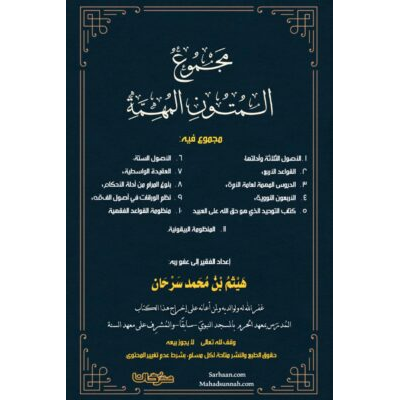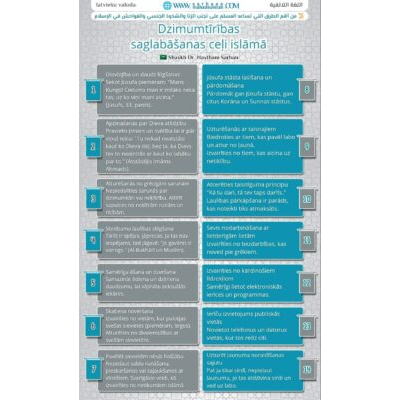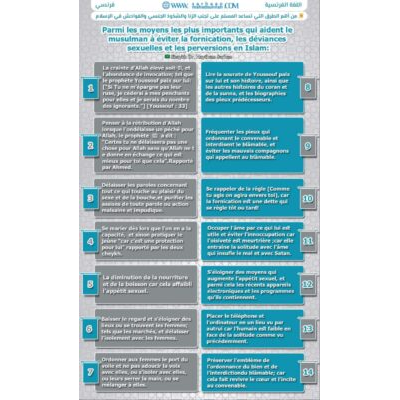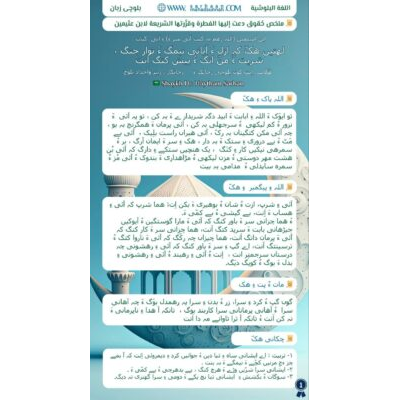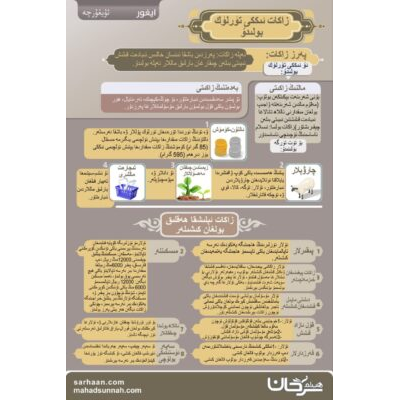
Summary of rights called for by Fitrah
ملخص حُقوق دعت إليها الفطرة وقرَّرتها الشريعة باللغة العربية لابن عثيمين رحمه الله Summary of rights called for by Fitrah (instinct/natural disposition) and approved by the Shari’ah (Islamic legislation) in the English language. By Ibn Uthaymeen - may Allah have mercy on him. 1ـ حقُّ الله تعالى أن تعبده وحده لا شريك له، وتكون عبدًا متذللا خاضعا له، ممتثلا لأمره،...
Summary of rights called for by Fitrah
ملخص حُقوق دعت إليها الفطرة وقرَّرتها الشريعة باللغة العربية لابن عثيمين رحمه الله
Summary of rights called for by Fitrah (instinct/natural disposition) and approved by the Shari’ah (Islamic legislation) in the English language. By Ibn Uthaymeen - may Allah have mercy on him.
1ـ حقُّ الله تعالى
أن تعبده وحده لا شريك له، وتكون عبدًا متذللا خاضعا له، ممتثلا لأمره، مجتنباً لنهيه، مصدِّقا بخبره، عقيدة مثلى، وإيمانٌ بالحق، وعمل صالح مثمر، عقيدة قوامها: المحبة والتعظيم، وثمرتها: الإخلاص والمثابرة.
1- The rights of Allah the Most High:
To worship Him Alone without any partners, and that you be a humble, submissive worshipper to Him, obeying His commands, avoiding His prohibitions, and believing in what He informed us about. It is a perfect Aqeedah (Islamic creed), belief in the truth, and righteous fruitful deeds. It’s an Aqeedah based on love and glorification; its fruit is sincerity and perseverance.
2ـ حقّ رسول اللّه ﷺ
توقيره، واحترامه، وتعظيمه؛ التَّعظيم اللائق به، من غير غلوٍّ ولا تقصير.
وتصديقه فيما أخبر به من الأمور الماضية والمستقبَلة، وامتثال ما به أمر، واجتناب ما عنه نهى وزجر، والإيمان بأن هديه أكمل الهدي، والدفاع عن شريعته وهديه.
2- The rights of the Messenger of Allah ﷺ:
The right of the Messenger of Allah ﷺ is to be honored, respected, and glorified appropriately without exaggeration nor deficiency.
Also believing him in what he has informed us about past and future events, doing what he commanded us to do, avoiding what he prohibited, believing that his guidance is the perfect guidance, and defending his Sharee’ah (Islamic legislation) and guidance.
3ـ حقوق الوالدين
تبرهما، وذلك بالإحسان إليهما قولًا وفعلا بالمال والبدن، وتمتثل أمرهما في غير معصية الله، وفي غير ما فيه ضرر عليك.
3- The rights of the Parents:
Be righteous to them by treating them with goodness in word and deed, with money and the body, and obeying their commands in that which is not disobedience to Allah and doesn't cause any harm to you.
4ـ حقُّ الأولاد
1ـ التربية؛ وهي تنمية الدين والأخلاق في نفوسهم حتى يكونوا على جانب كبير من ذلك
2ـ أن ينفق عليهم بالمعروف من غير إسراف ولا تقصير
3ـ ألا يفضل أحدا منهم على أحد في العطايا والهبات
4- The rights of children:
1- Upbringing: it is the development of religion and morals in their hearts to a high standard.
2- To spend on them in a reasonable manner, without extravagance nor negligence.
3- Not to give preference to any of them over the other in spending and gifts.
5ـ حقوق الأقارب
أن يصل قريبه بالمعروف؛ ببذل الجاه، والنفع البدني، والنفع المالي بحسب ما تتطلبه قوة القرابة والحاجة.
5- The rights of relatives:
To uphold ties of kinship with kindness by using your social position, physical efforts to benefit them, and financially depending on how close and needy they are.
6ـ حقّ الزوجين
أَن يعاشر كل منهما الآخر بالمعروف وأن يبذل الحق الواجب له بكل سماحة وسهولة من غير تكرّه لبذله ولا مماطلة.
من حقوق الزوجة على زوجها: أن يقوم بواجب نفقتها من الطعام والشراب والكسوة والمسكن وتوابع ذلك، والعدل ببن الزوجات.
من حقوق الزوج على زوجته: أن تطيعه في غير معصية اللّه، وأن تحفظه في سره وماله، وألا تعمل عملا يضيع عليه كمال الاستمتاع.
6- The rights of spouses:
To live with each other in a kind manner and give the right that is due to him with tolerance and ease without any compulsion or procrastination in fulfilling each other’s rights.
Among the rights of the wife over her husband: that he fulfils the duty of spending on her in terms of food, drink, clothing, housing and so on, and that he treats all his wives equally.
Among the husband’s rights over his wife: that she obeys him in that which is not disobedience of Allah, protects his secrets and wealth, and does not do something that would spoil his complete enjoyment.
7ـ حقوق الولاة والرعية
حقوق الرعية على الولاة: أن يقوموا بالأمانة التي حملهم الله إياها وألزمهم القيام بها من النصح للرعية والسير بها على النهج القويم الكفيل بمصالح الدنيا والآخرة، وذلك باتباع سبيل المؤمنين.
حقوق الولاة على الرعية فهي: النصح لهم فيما يتولاه الإنسان من أمورهم، وتذكيرهم إذا غفلوا، والدعاء لهم إذا مالوا عن الحق، وامتثال أمرهم في غير معصية الله، ومساعدتهم.
7- The rights of rulers and subjects:
The rights of the subjects on the rulers: to carry out the trust that Allah has given them and obligated upon them, such as advising their subjects and taking them on the right path that guarantees their benefit in this world and the hereafter, and that is by following the path of the believers.
The rights of rulers over the subjects are: advising them in what a person is responsible for in their affairs, reminding them if they become negligent, making Du’a’ (praying) for them if they deviate from the truth, obeying their commands in that which is not disobedience to Allah, and helping them.
8ـ حق الجيران
الجار: هو القريب منك في المنزل، يحسن إليه بما استطاع من المال والجاه والنفع، ويكفّ عنه الأذى القولي والفعلي.
1ـ إن كان قريبا منك في النسب وهو مسلم فله ثلاثة حقوق: حق الجوار، وحق القرابة، وحق الإسلام.
2ـ إن كان مسلما وليس بقريب في النسب فله حقان: حق الجوار، وحق الإسلام
3ـ وكذلك إن كان قريبا وليس مسلما فله حقان: حق الجوار، وحق القرابة
4ـ إن كان بعيدا غير مسلم فله حق واحد: حق الجوار
8- The rights of the neighbors:
A neighbor is someone who lives close to you. You should be good to him with what you can using money, social position, and help. You should also refrain from any verbal or physical harm.
1- If he is a relative and a Muslim, he has three rights: the right of the neighbor, the right of kinship, and the right of Islam.
2- If he is a Muslim but not a relative, he has two rights: the right of the neighbor and the right of Islam.
3- Likewise, if he is a relative and is not a Muslim, he has two rights: the right of the neighbor and the right of kinship.
4- If he is not related and is a non-Muslim, he has only one right: the right of the neighbor.
9ـ حقوق المسلمين عموما
منها السلام، وإذا دعاك فأجبه، وإذا استنصحك فانصحه، وإذا عطس فحمد الله فشمّته، وإذا مرض فعده، وإذا مات فاتبعه، وكف الأذى عنه.
حقوق المسلم على المسلم كثيرة، ويمكن أن يكون المعنى الجامع لها هو قوله ﷺ «المسلم أخو المسلم» فإنه متى قام بمقتضى هذه الأخوة اجتهد أن يتحرى له الخير كله، وأن يجتنب كل ما يضره.
9- The rights of Muslims in general:
From them is: giving Salam; if he invites you, accept the invitation; if he asks you for advice, advise him; if he sneezes and says 'Alhamdulillah', say 'Yarhamukallah'; if he is sick, visit him; if he dies, follow his funeral; avoid causing him any harm.
The rights of a Muslim over a Muslim are many, and they can be summarized in meaning by the Prophet's ﷺ saying: “A Muslim is a brother to a Muslim." Fulfilling the requirements of this brotherhood will make a person strive to seek all goodness for his Muslim brother and avoid anything that harms him.
10ـ حق غير المسلمين
يجب على ولي أمر المسلمين أن يحكم فيهم بحكم الإسلام في النفس والمال والعرض، وأن يقيم الحدود عليهم فيما يعتقدون تحريمه، ويجب عليه حمايتهم وكف الأذى عنهم.
ويجب أن يتميزوا عن المسلمين في اللباس، وألا يظهروا شيئا منكرا في الإسلام، أو شيئا من شعائر دينهم؛ كالناقوس، والصليب.
10-The rights of non-Muslims:
A Muslim ruler must rule over them with the law of Islam in their lives, wealth, and honor, set limits on them according to what is Haram (forbidden), and he must protect them and not harm them.
The disbelievers must be distinguished from Muslims in dress code. Also, they must not show (i.e., publicly) anything objectionable in Islam or any of the rituals of their religion, like the bell or the cross.

Summary of rights called for by Fitrah
Scan QR Code | Use a QR Code Scanner to fast download directly to your mobile device

रोजाको चार्ट: यो डा. हैथम सरहानको रचना हो, जसमा उनले रोजासम्बन्धी महत्वपूर्ण विषयहरूलाई स्पष्ट रूपमा प्रस्तुत गरेका छन्। यसमा फर्ज (अनिवार्य) र मुस्तहब रोजाको उल्लेख गरिएको छ, रोजाको परिभाषा दिइएको छ, ती अवस्थाहरू उल्लेख गरिएको छ जब रोजा गर्नु मक्रूह वा हराम हुन्छ, र रोजासम्बन्धी महत्वपूर्ण फिकही (धार्मिक कानुनी) नियमहरूलाई एउटै तालिकामा समेटिएको छ।
July 6, 2025

ज़कातको चार्ट: यो डा. हैथम सरहानको रचना हो, जसमा उनले ज़कातका फर्ज र मुस्तहब पक्षहरू सम्बन्धी महत्वपूर्ण विषयहरूलाई स्पष्ट पारेका छन्। यसमा ज़कातको परिभाषा, ती सम्पत्तिहरू जुनमाथि ज़कात अनिवार्य हुन्छ, र ती व्यक्तिहरू जसलाई ज़कात दिन सकिन्छ, साथै ज़कातसँग सम्बन्धित महत्वपूर्ण फिकही (धार्मिक कानुनी) नियमहरूलाई एउटै समग्र तालिकामा प्रस्तुत गरिएको छ।
July 6, 2025

ראיות על הנבואה הקוּרָאן יִחְיָא בֶּן אַכְּתַ'ם (בְּכִיר הַקָּאדִים בְּעִירָק בימי הח'ליף הַעַבָּאסִי אַל-מָא'מוּן) אמר: היה לְאַל-מָא'מוּן, כשהיה האמיר באותה תקופה, מועצת דיונים - כלומר, מושב לעימותים דתיים. בין האנשים הנוכחים היה גבר יהודי פניו יפות, בגדיו נאים וריחו נעים.
July 6, 2025

रोजाको चार्ट: यो डा. हैथम सरहानको रचना हो, जसमा उनले रोजासम्बन्धी महत्वपूर्ण विषयहरूलाई स्पष्ट रूपमा प्रस्तुत गरेका छन्। यसमा फर्ज (अनिवार्य) र मुस्तहब रोजाको उल्लेख गरिएको छ, रोजाको परिभाषा दिइएको छ, ती अवस्थाहरू उल्लेख गरिएको छ जब रोजा गर्नु मक्रूह वा हराम हुन्छ, र रोजासम्बन्धी महत्वपूर्ण फिकही (धार्मिक कानुनी) नियमहरूलाई एउटै तालिकामा समेटिएको छ।
July 6, 2025

ज़कातको चार्ट: यो डा. हैथम सरहानको रचना हो, जसमा उनले ज़कातका फर्ज र मुस्तहब पक्षहरू सम्बन्धी महत्वपूर्ण विषयहरूलाई स्पष्ट पारेका छन्। यसमा ज़कातको परिभाषा, ती सम्पत्तिहरू जुनमाथि ज़कात अनिवार्य हुन्छ, र ती व्यक्तिहरू जसलाई ज़कात दिन सकिन्छ, साथै ज़कातसँग सम्बन्धित महत्वपूर्ण फिकही (धार्मिक कानुनी) नियमहरूलाई एउटै समग्र तालिकामा प्रस्तुत गरिएको छ।
July 6, 2025

ראיות על הנבואה הקוּרָאן יִחְיָא בֶּן אַכְּתַ'ם (בְּכִיר הַקָּאדִים בְּעִירָק בימי הח'ליף הַעַבָּאסִי אַל-מָא'מוּן) אמר: היה לְאַל-מָא'מוּן, כשהיה האמיר באותה תקופה, מועצת דיונים - כלומר, מושב לעימותים דתיים. בין האנשים הנוכחים היה גבר יהודי פניו יפות, בגדיו נאים וריחו נעים.
July 6, 2025


